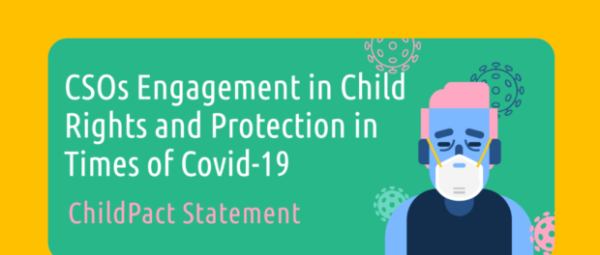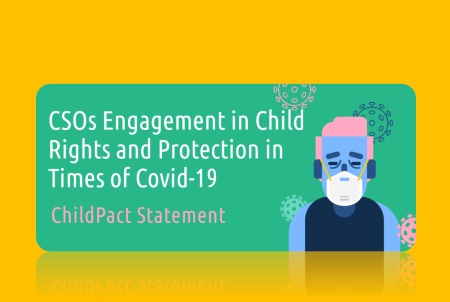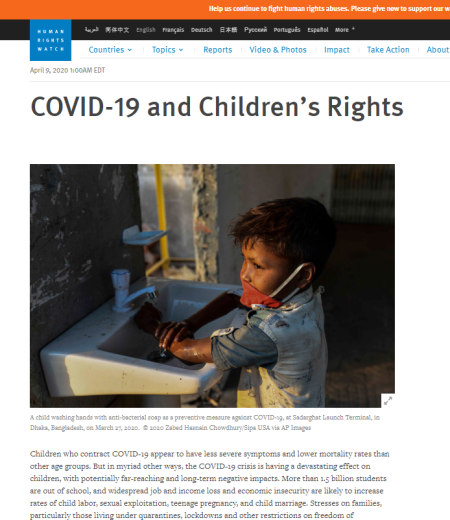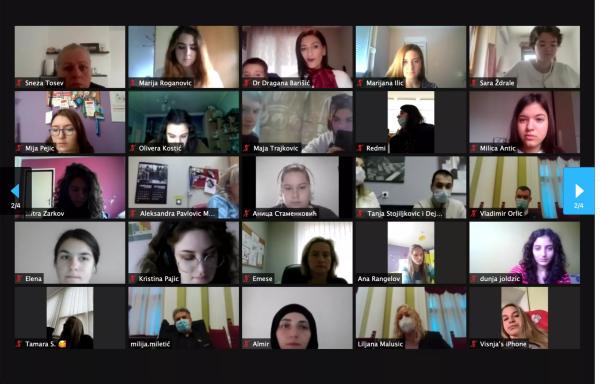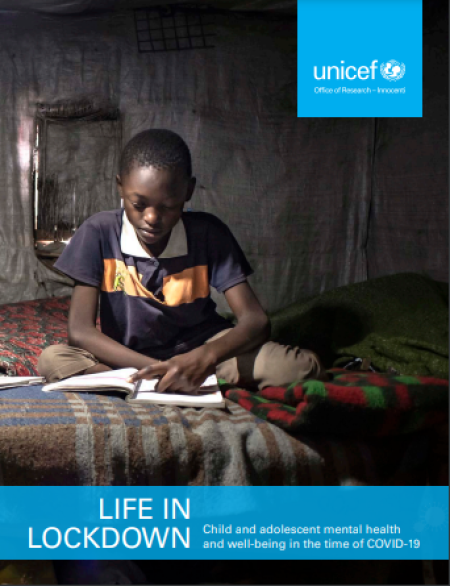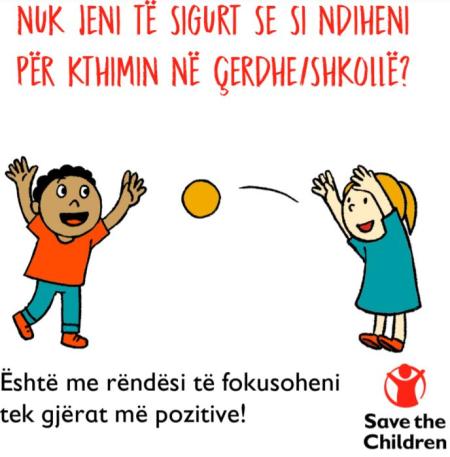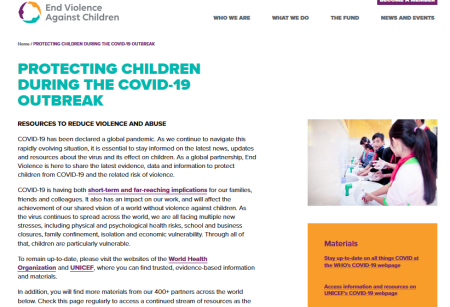Download ChildPact FULL STATEMENT (PDF)
28 April 2020
The current Covid-19 pandemic has changed the way of life of people from all countries across our region. All the systems our societies are built upon are challenged and their shortages bluntly exposed by this crisis. Careful analysis is required to ensure in-depth understanding of the gaps in the systems that we need to change to ensure proper protection for the most vulnerable children and adequate realization of children rights for all. Immediate action and increased cooperation among all actors is required in order to diminish the impact of crises on the children in our region and safeguard their physical and psychological health.
Governments, donors, CSOs, media and adult citizens share the overarching responsibility to safeguard the best interest of the child in all actions undertaken to contain the spread of the virus and ensure life preservation and safety of all children, especially children with disabilities and special needs, children without parental care or refugee and migrant children.
Among our utmost concerns are:
- Severe exacerbation of the impact of poverty and deprivation affecting large numbers of vulnerable children and families, many of which are already experiencing hunger
- Severe limitation or complete deprivation of significant numbers of children, especially children with special needs and children without parental care, of access to basic services like care and assistance, education, psychological support, therapy, counseling and rehabilitation
- Significant increase of exposure of children to violence due to extended lockdown and/or improper living conditions and online violence due to increased access to internet and limited supervision
- Significant increase of the unequal access to education of children from vulnerable families, children without parental care or children in rural and marginalized urban areas due to limited access to internet and availability of adequate devices
- Exclusion of CSOs from access to governmental plans for mitigating the economic impact of the current pandemic, exposing employees of CSOs to diminished or complete loss of income and beneficiaries to deprivation of support and services provided by CSOs
As a regional network reaching out to over 650 child-focused NGOs in the extended Black Sea Region and Western Balkans, ChildPact reaffirms its commitment to build a strong network of support for child-focused CSOs in our region and to be a voice of support for all children, especially those exposed to new and increased vulnerability due to the Covid-19 pandemic, and for CSOs serving thousands of vulnerable children across the region. ChildPact supports the specific demands and recommendations issued at national level by our members in joint collaboration with other actors.
THE SITUATION ACROSS THE REGION
We have all been taken off guard by the Covid-19 pandemic, but the speed of positive and bold action may mark the difference between successful overcoming of it and failure to protect our children. Many countries have strived to keep services for children available and adapt them to remote provision and ensure the timely payment of social benefits and financial support schemes.
In Georgia the state has prepared dedicated spaces for victims of violence, while in Armenia, Azerbaijan and Kosovo[1] CSOs are managing or ensuring permanence of the emergency hotlines. In Armenia CSOs contribute human resources to the management of quarantine areas allocated by the state to street connected children and organize trained mobile groups providing child care and support in state-managed quarantine areas. In Bosnia and Herzegovina, the NGO Helpline for Child Victims of Violence has expanded its operations to support children and citizens in time of Covid 19. In Kosovo, shelters and community based homes for children run by CSOs are continuing to offer 24/7 services and shelter for children without parental care, victims of abuse and trafficking, while other CSOs which provide direct social services for children, services for children with disabilities and children involved in child labor have closed their services based on the decision of the state authorities.
Many CSOs in the region have switched their work to online counselling sessions for children, online parents support and awareness rising. In many countries citizens and CSOs have mobilized with donations for food and basic supplies provided to vulnerable families with children. In Bosnia and Herzegovina, besides wide humanitarian actions, the members of the national network Stronger Voice for Children members are producing free of charge facial masks. In Bulgaria the United Against Covid-19 Response Fund has been established in April by local and international businesses, individuals, CSOs, embassies and the Chamber of Commerce, aimed at providing assistance to CSOs working in communities most severely affected by the outbreak; donations from CSOs to the state institutions proving medical assistance and social care are reported in Azerbaijan, Moldova and Romania.
The National Network of Organizations for Children of Serbia MODS has provided children the opportunity to express their feelings and experience in relation to the current crisis and voice their suggestions and concerns, providing a genuine and much needed perspective on decision making processes during crisis. In Romania, Bosnia and Herzegovina and Bulgaria CSOs have been actively contributing to policy making and contingency planning for tacking the crises, with their suggestions being more or less taken into consideration by the governments. In many countries the schools have been closed, while the education continues online (in Georgia, Moldova, Serbia, Bulgaria and Romania). Turkey, Azerbaijan, Kosovo and Georgia are broadcasting lessons at the national television while Azerbaijan and Kosovo’s Ministries of Education have made available a dedicated online platform. Georgia organized a hot line for children and families to collect their needs and refer other relevant entities to support and answer all their needs, with UNICEF support, while the government offered basic social package for poor families, families with children and children with disabilities. Under the declaration of state of emergency, several countries have limited or suspended several basic human rights, making the monitoring of the activity of public institutions and the respect for human rights in general and children rights in particular more difficult (especially Georgia and Romania). In Turkey CSOs have been opposing the plan that convicts for sexual abuse and rape might benefit from conditional release or penalty reduction as part measures to prevent spread of Covid-19. CSOs in Turkey report that children who are victims of abuse and women and children who are victims of domestic violence have difficulty in accessing judicial authorities.
Many emergency support packages implemented by the governments to mitigate the negative economic impact of the pandemic exclude CSOs as potential beneficiaries, either directly or due to the business-tailored eligibility criteria (this is the case in Moldova, Armenia, Bulgaria, Bosnia and Herzegovina and Turkey). In Kosovo the Emergency Fiscal Package issued by the government includes CSOs among the beneficiaries of subsidies for salaries and rent for 2 month under certain conditions. CSOs in Romania have managed to include CSO employers among the eligible beneficiaries of state supported schemes for partial salary coverage.
After the request of Coalition KOMF in Kosovo, the government has approved the inclusion of the Kinship Care and Scheme for Material Support for Families of Children with Permanent Disabilities under the Emergency Fiscal Package.
In Bosnia and Herzegovina CSOs benefit from 2 month rent-free use of space in the municipality of Banja Luka. Dedicated funding schemes are available in Moldova, Georgia, Armenia and Serbia to support CSOs response to the crises (provision of continued distance education, provision of emergency services to the most vulnerable, etc.) from donors active in the region, such as the Central European Initiative Fund, Black Sea Trust, European Commission, European Youth Foundation, UNICEF, USAID or Oak Foundation, while in Azerbaijan some funding has stopped since the start of the outbreak.
THE CHALLENGES ACROSS THE REGION
Basic children rights are in questions due to the Covid-19 containment measures. Children form separated families are deprived of interaction with their other parent due to lockdown restrictions, while many children experience increased neglect and reduced quality supervision, especially in families of health care workers and professionals involved in the crises management actions.
Children with special needs and children in alternative care (especially institutional type) are significantly affected by the isolation, limited or no access to basic services such as education, social assistance, psychological support, therapy or rehabilitation, as CSOs in Moldova, Georgia, Armenia, Romania and Serbia are reporting.
In some parts of Bosnia and Herzegovina children were not allowed to leave their homes at all for weeks, thus experiencing a long period of isolation and distress, under various conditions of living, not always among the best, with parents able to various degrees to communicate properly the context of the pandemic to children and with very limited or no access to specialized support services in this regard. In Kosovo and Bosnia and Herzegovina, children with disabilities which have so far received regular psychological and social services, physical rehabilitation through the day care centers have been left without access to services, as these services have been closed due to the pandemic situation. Some CSOs have started to provide online services for children. In Bosnia and Herzegovina, CSOs started online work with children beneficiaries of Centers for children at risks and children working/living on streets.
The extended lockdown period leads to increased incidence of violence against children and women, reported in Moldova, Georgia, Armenia, Serbia, Azerbaijan, Bosnia and Herzegovina and Romania. The improper living conditions and financial difficulties are favoring violence against women and children.
Increased inequality of the access to education due to limited availability of devices and reliable internet connection in rural and marginalized urban areas, and among vulnerable families is reported in Moldova, Georgia, Serbia, Armenia, Bulgaria, Bosnia and Herzegovina and Romania. There are significant differences in the quality and quantity of the contact between teachers and children that affect the capacity of children to learn at home as the survey applied on children in Serbia highlights. Challenges to learning at home are enhanced by the use of too many different applications, storage limitations of the available devices, degree of user-friendliness and intuitive user experience of the available online learning apps and tools. The increased use of internet and limitation in supervision capacities of parents and care-givers leads to exposure of children to inappropriate content, dangerous games, sexual abuse, and cyber-bullying in the online environment. In Bosnia and Herzegovina, the SVC network members provide daily online educational and entertaining facilities for children and teachers since the beginning of April 2020.
Many CSOs in the region are concerned about the exacerbation of poverty and deprivation under the current situation, affecting already vulnerable families. In most countries of the region the expected loss of jobs and income increases the risk of child neglect, abuse and even abandonment due to limitation of parents’ capacity to provide adequate care for the children. All these circumstances generate increased needs for psychological support for children and families so they can face the isolation, distress and sense of insecurity generated by the pandemic. At the same time the shortage of trained professionals in social assistance and care, psychological support, counselling and rehabilitation is becoming more and more obvious under the crisis conditions. The level of parental skills of parents and care givers plays a key role in adequate communication with children and capacity of parents to provide comfort and the sense of safety to the children, showcasing the importance of parental education in all countries across the region.
OUR RECOMMENDATIONS
To Governments
- Include CSOs in the contingency support measures prepared for overcoming the economic challenges of the crisis
- Cooperate with CSOs for identification and support of the high risk families (single parent families, families experiencing poverty, low income families, marginalized families, families with improper living conditions etc.)
- Support CSOs in organizing volunteers to provide assistance to the most vulnerable (include volunteering in the list of allowed activities, provide safety equipment for volunteers, ensure openness and cooperation from the public institutions working with vulnerable groups to accept CSOs and volunteer support in full respect of the safety and security guidelines)
- Provide free internet access and devices for children in vulnerable families, rural areas or residential and alternative care to ensure their access to education
- Identify and implement measures that will ensure long lasting solutions for problems such as adequate housing and access to water affecting thousands of children
To Donors
- Adjust the administrative procedures to the size of grants and ensure smooth application and reporting processes to allow concentration of time and efforts for the intervention rather than the administrative requirements
- Take a flexible approach with regard to the projects and programs currently under implementation allowing for changes in activity type and budget allocations adapted to the current situation (replacing face to face activities with alternative actions, relocation of budgets towards emergency support and assistance etc.)
- Support with small grants the CSOs’ administrative activities, including but not limited to office costs, administrative and financial management, communication costs (fixed and mobile telephony, internet, etc.) as the amount of administrative expenses has increased due to the efforts of CSOs to mobilize volunteers and provide assistance to the most vulnerable
To Media
- Tailor communication to be child-friendly, avoiding sensationalism and drama in coverage of the pandemic
- Communicate wisely the current reality based on correct, complete and double-checked information
- Offer pro-bono space (radio, TV, written press) for online educational activities, showcase of volunteer support and exposure of positive news that may help the population deal better with distress and isolation caused by the crisis
FULL STATEMENTS FROM CHILDPACT MEMBERS
Romania: The impact of isolation on children, including the “invisible” children
Serbia: Being a child during Covid-19 pandemic
Bosnia and Herzegovina http://snaznijiglaszadjecu.org/blog/2020/04/27/ngo-request-for-revision-of-the-proposal-of-the-fbih-corona-law-2020/


